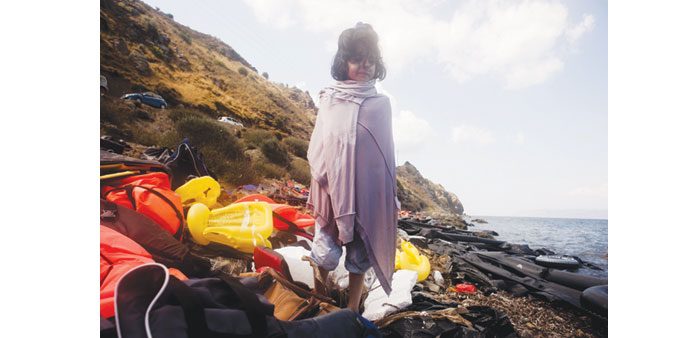A girl watches as migrants arrive yesterday on dinghies on the Greek island of Lesbos, after crossing the Aegean sea from Turkey.
AFP
Zagreb
Croatia sought to ease tensions with its former foe Serbia yesterday after the EU’s powerful executive intervened in a bitter row sparked by Europe’s biggest post-war influx of migrants.
In their worst spat since the 1990s Yugoslavian conflict, the two countries have been embroiled in tit-for-tat restrictions caused by the human exodus washing through the Balkans bound for northern Europe.
Croatia has seen nearly 60,000 new arrivals since last week when Hungary sealed its southern border with Serbia.
Overwhelmed by the sheer numbers, Croatia has closed all but one of its border crossings with Serbia and blamed Belgrade for diverting an unrelenting flow of migrants towards its frontier.
This week Belgrade closed the main Bajakovo-Batrovci crossing – the last one still open – to all trucks with Croatian plates, while Croatia closed the crossing to trucks and cars with Serbian plates.
Belgrade compared the border restrictions taken by Zagreb to those “taken in the past at the time of the (Nazi) fascist regime in Croatia” during World War II.
In Brussels, the European Commission said that it was “urgently seeking clarifications” from Croatia, while EU foreign policy chief Federica Mogherini phoned both Serbia and Croatia’s leaders.
The intervention appeared to work, and with business groups warning about damage to trade, Croatia’s interior minister announced that the restrictions would be lifted at 5pm (1500 GMT).
Prime Minister Zoran Milanovic however warned he might reintroduce similar restrictions in future.
“I cannot and will not do otherwise,” he told reporters.
As thousands of migrants and refugees continued to stream through Croatia, non-EU Macedonia said trucks with Macedonian number plates were also being affected by the restrictions.
As the weather turned wet and cold, migrants – some still clad for summer – kept coming yesterday, with six buses carrying some 600 arriving at the Beremend crossing point between Croatia and Hungary mid-afternoon, an AFP correspondent said.
“Last night was tough. It was raining so much. I was cold. I am happy to be making progress, I hope I can make it to a good place to start a new life far from war, the Taliban,” Bashir Ahmad, 20, from Afghanistan, told AFP.
“Everything is bad on this journey, nothing is good. Everyone is exhausted. Yesterday was a very bad day, particularly because of the weather,” said a 30-year-old Syrian hoping to join his family in Amsterdam.
Zagreb now buses a large majority of the migrants straight to the border with Hungary, and Prime Minister Viktor Orban said yesterday that Budapest eventually planned to seal its border with Croatia too.
“The influx of migrants is not going to abate ... we want to stop people crossing,” Orban told reporters in Vienna after a meeting aimed at smoothing over differences with Austrian Chancellor Werner Faymann.
Hungary’s border closure – and the razor-wire barriers it has set up along its frontiers with Serbia and parts of Croatia not marked by the Drava river – have been widely criticised.
On Thursday, Budapest announced it had also started to roll out a mobile barrier along its border with Slovenia – the first such measure within the EU’s treasured passport-free Schengen zone.
The influx of refugees has raised tensions not only between Balkan countries but has exposed deep fault lines between western and former communist eastern countries in the 28-nation European Union.
There have been growing fears that the Schengen zone could buckle as states reintroduce border checks to stem a flow of migrants inside the bloc, many of whom are heading for Germany.
Leaders at an EU emergency summit in Brussels on Wednesday papered over the differences, agreeing to boost aid for Syria’s neighbours – home to millions of people fleeing the Syrian civil war and Islamic State (IS) extremists.
They also aim to strengthen the bloc’s outer frontiers and create controversial “hotspot” reception centres in frontline states like Greece and Italy to sort more quickly real refugees from economic migrants.
On Tuesday, interior ministers also decided to relocate 120,000 refugees among most of the EU states, defying opposition from eastern countries Hungary, the Czech Republic, Romania and Slovakia.
The relocations are just a fraction of the 500,000 migrants who have come to Europe’s shores so far this year and the estimated 4mn who are camped on Syria’s borders.
Inside the EU countries too, there were tensions.
In the early hours of yesterday morning around 40 protesters in Finland, including one in Ku Klux Klan garb, attacked a bus transporting asylum seekers.
And as diplomatic wranglings continued, the International Organisation for Migration (IOM) said 2,873 people had died or gone missing.
The Greek coastguard said yesterday that it was looking for seven migrants feared missing near the Aegean island of Kos.

